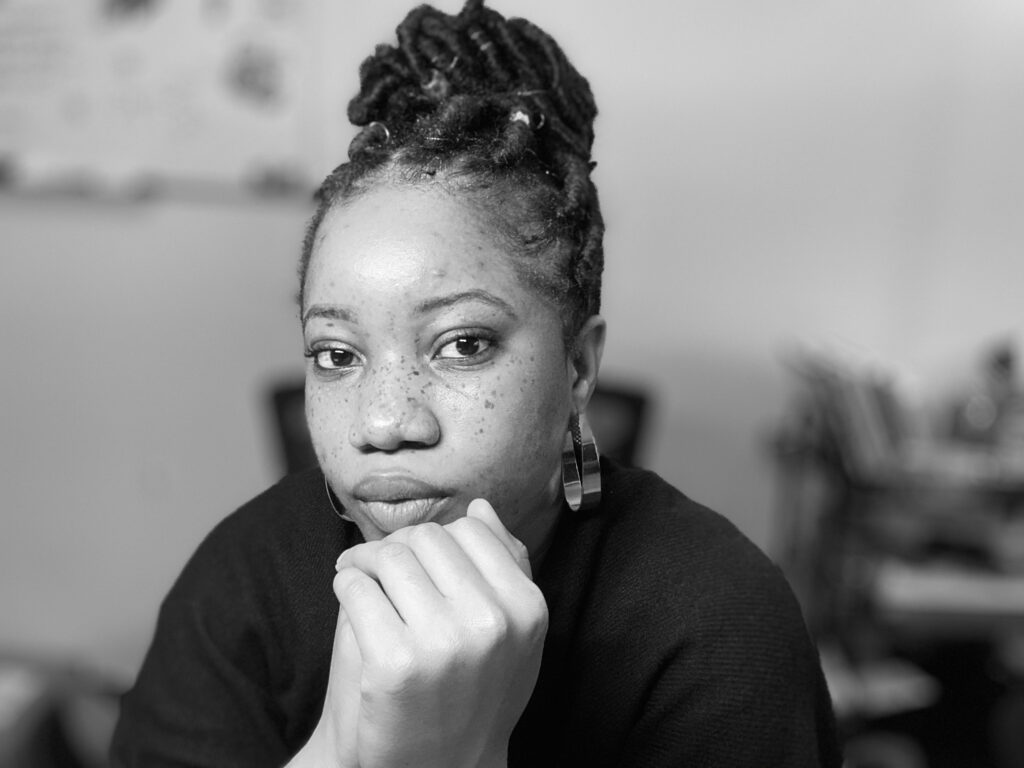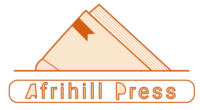
An Interview with Oyinda Shoola.
Interviewed by Olaide Oluwafunmilayo Soaga (Features Editor, Afrihill Press).
As a poet, what is your writing process?
My writing process is the same regardless of the genre. It goes one of two ways after a profound thought worth exploring comes to mind. Sometimes, I ignore it and refuse to write until it’s fully formed. Other times, I write down the idea and scraps of any relative thoughts, then return to edit later. I am not the type of writer who sits down for a dedicated number of hours to write daily. It’s unrealistic for me. Moreso, the most tasking part of my writing is editing and revisions to make a single clear meaning of a piece.
For example, yesterday, I had an idea for a poem about the devil as a designer and jotted down the punchlines that came to mind. Then, during my break today, I spent an hour reading aloud repeatedly and editing until it was unified, concise, and coherent to pass the intended point.
Do you enjoy poems that convey opinions you disagree with?
What matters in my principles of knowledge acquisition is if I understand what the other person or work is communicating; if it is reasonable, meaningful, and applicable. Especially knowing how feelings are highly unreliable and implicated by other things happening in a person’s life, I don’t think it’s fair to oversimplify my reaction or relationship to any work of art or literature to my ability to enjoy it whether I agree or disagree with the opinions it conveys. Ultimately, I like to be conscious of what the creator is trying to achieve (if such information is available) and if it aligns with the outcomes of my engagement with the work.
What is your favourite poem written by another poet?
I don’t have a particular favourite poem by another poet. However, my most recent favourite anthologies are Tolu Akinyemi’s Her Head Was a Spider’s Nest and Seun Lari-Williams’ A Little Violence. Both anthologies align with and inspire what I am trying to accomplish with my recent poems: a shared simplicity, relatability, and humor about the commonalities of life.
How do you infuse feminism into poetry?
Right now, I don’t. It is not something I am interested in doing because I am outgrowing my initial convictions of feminism or at least balancing it with contradicting perspectives backed by research. My feminism (if there is any left) is more of an actionable passion for driving change rather than a tool to manage people’s feelings into believing something without evaluation or engagement. When I reflect on my previous published works with strong feminist bases, I struggle to relate to them as I did at the time and sometimes wish I was patient in objectively revising them before publication. However, I understand that everything is a learning experience, and those writings had to be published for other things in my life to happen or for me to grow.
What is the most difficult part of your artistic process as an African writer in the diaspora?
The most challenging part of my artistic process as an African writer abroad has resulted from my own choices. I am currently completing my Master’s in Creative writing. While I have found the most delight in the experience, at times, I wish my work was being evaluated by a group of people who I don’t have to explain cultural nuances to understand what I am trying to accomplish. My current writings are satirical, and explaining a joke or sarcasm ruins the punchline. So, if I am writing about how Bimpe’s heart is as hard as Aso Rock, sometimes, I don’t want to make any effort to explain what or where Aso Rock is to a non-Nigerian or African reader. I am making the best use of what I have signed up for and open to what this academic experience offers. However, at times, I wish I was doing the MFA among other Nigerians since they are the primary characters and audience of my current work.
Who are your favourite writers and how has their writing influenced yours?
My favourite writers differ in context and genre. Besides Tolu Akinyemi and Seun Lari-Willams, I love Tomi Adesina’s scriptwriting for movies like Hakkunde and The Wait. When I watch the movies she is involved in, I am actively paying attention to the execution of language and the beauty of the words put together to provoke specific emotions. I love Robert Greene and Malcolm Gladwell’s straightforwardness and analytical style in their nonfiction work. It informs my blogging, academic, and career writing style. Ultimately when I read their works, I am conscious of not swindling myself with feelings and ensure that my writing, regardless of the genre or purpose, is effective in accomplishing what I intend. I also listen to many of their speaking engagements because I admire how they think. I believe the most extraordinary writers are great thinkers too.
What was the driving force to establish SprinNG?
Initially, my driving force was to solve the problems that developing Nigerians are facing. However, as SprinNG grew, it became more about the brilliant and kind people I met through the community, such as the fellowship. I can brag about our accomplishments and detail my sacrifice to get it where it is. However, what made me wake up every day and commit to executing its mission were writers ready to succeed if equipped, and equally, people prepared to help them succeed.
SprinNG is currently led by the wonderful Ebukun Gbemisola Ogunyemi, our first Director. I am very excited about the future she is driving SprinNG towards. I have moved into a Board of Director role with four other members.
What do you think about the stand of female writers in the African writing industry?
On one end, I think, what’s the stand of female writers in the African writing industry? Perhaps, I haven’t done much research on this, but I haven’t seen as many gender-focused literary or creative-writing groups or platforms. I know gender-related problems with education and literacy accessibility in Africa is backed by research and ongoing conversations by bodies such as UNESCO and UNICEF. However, I am very conscious of assuming an overlap between general gender issues with problems of the African writing industry. I am also hesitant to generalize or specialize a single problem without a proven cause as an attribute of a group of people. Not to undermine the existence of any of these issues if they exist, but I question if some of these issues or stances are factually gender-based. I have been involved in projects and conversations founded on such perspectives that proved otherwise.
Notably, because of my commitment to a set of problems that affect a broader community regardless of gender, the stance of female writers in the African writing industry isn’t a significant priority for me. However, I have contributed to projects such as the SprinNG Women Authors Prize dedicated to uplifting the voices of female Nigerian writers specifically.
Ultimately, I don’t think I am as physically and creatively involved in verifying and justifying my perception of gender differences, stances, or issues within the industry and the African continent as I would like. However, I am open to being informed and engaging if there are any.
As an African writer in the diaspora, how do you see the growth of African literature home and abroad?
There are several things we can discuss regarding the growth of African literature. However, because I do a lot of education-related work, one thing that is very obvious to me is the mass migration of African writers to other continents to pursue a Master’s in Creative writing. There is growth in the book-publishing industry, accessibility of books, increase in readers, and even embrace of African writers internationally. There are so many variations of the opportunity to pursue a Master’s in Creative writing in Nigeria and African countries, like Literature in English majors or even fellowship opportunities. However, one growth I would love to see is more MFA Creative Writing programs with a focus on literary genres like poetry, fiction, and creative nonfiction in Nigeria and other African countries. And it isn’t just about the academic offering I hope will be available but dedicated funding for residency opportunities, teaching assistantships, student-led publication groups or platforms, and more.
What are your future projects?
I am currently working on an anthology of romantic comedy poems as my MFA Graduate thesis. It is a larger body of work on the things I have shared on Instagram, which people have expressed much interest in. I don’t know when it will be published or how but ultimately, my dream is to work with a traditional publisher in the United States and at home, Nigeria. My biggest fantasy is that the book will be interpreted into multiple languages because it is such a cultural and literary chameleon that I believe people don’t need to love poetry or only be literate in English to enjoy it. It is a book I am writing with the intention of commonality and relatability for the average person whether or not they like reading or poetry. My other big fantasy is to do a book tour if the publication is successful but who knows what the future holds?
Aside from writing, what else do you do?
Many people don’t know this, but I work full-time in the education industry. Also, I recently started traveling and will be doing more of that this year just for fun. I also love exercising for at least 1 hour daily (during the months I am committed to) and eating good food at well-rated restaurants.
Oyindamola Shoola received an associate degree in Psychology from the City University of New York (CUNY): Bronx Community College in 2017. In 2020, She graduated from New York University with a bachelor’s degree in Organizational Behavior and Change. She is pursuing a Master of Fine Arts in Creative Writing, poetry at the American University.
While pursuing her bachelor’s degree, she gained experience interning at several top trade and academic publishing companies such as Elsevier, Simon and Schuster at 37Ink, and Hachette Book Group. She has additional experience serving as a student co-editor for the New York University SPS Dovetail Magazine (Spring 2019) and book reviewer with a Nigerian publisher named WRR – Authorpedia.
Her writings including fiction, op-ed articles, and poetry have been published through several literary platforms and magazines like Black Fox, Phi Theta Kappa’s Nota Bene, Authorpedia, Dovetail, Kalahari Review, and others.
Oyindamola worked in the higher education industry for the over 6 years in the United States. Using her creative writing and storytelling skills, she has helped students secure over a million dollars in scholarships and gain admission to several top academic programs. Part-time, she is a freelancer, Op-Ed blogger, and Co-founder of SprinNG, a non-profit organization dedicated to supporting Nigerian writers. Secretly but obviously, she contributes to the notorious voice of @halimaseries on Instagram.
Books and chapbooks by Oyindamola include To Bee a Honey, The Silence We Eat, Heartbeat, Now, I Want to Remember, Forget It, and But Here You Are.

